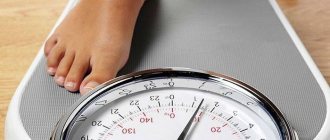Optimal time for dinner
The last meal before bed is determined individually and depends primarily on the expected time of sleep. For example, if you have a habit of going to bed around 21:00, then your last meal time falls at 18:00, and not an hour later or earlier, because... A late dinner will be harmful to your health, and too early will cause discomfort for the night.
On average, a person's last meal before bed should take no more than 10 minutes. And this is quite possible, since for dinner only light dishes that do not require cooking are allowed. If dinner is delayed, the stomach will not have time to digest the food received, as a result of which the person will gradually gain weight (this will become especially noticeable in the abdominal area).
What is the ideal dinner?
For people with a healthy gastrointestinal tract, an ideal dinner includes foods such as:
- Boiled chicken meat (fillet or breast).
- Any vegetables that do not have high acidity (can be in the form of an unsalted salad).
- Cottage cheese without sour cream and sugar.
- Oatmeal.
- Kefir or yogurt with low fat content, and without added chocolate and sugar.
- Some fruits are banana, persimmon, apple, etc.
Important! Patients suffering from digestive tract problems are allowed to consume these products in small quantities, 1-1.5 hours before bedtime. Since going to bed on an empty stomach is prohibited if you have pathologies of the digestive system.
Of course, for people with good digestion, 3-4 hours before bedtime it is not prohibited to eat heavy food. After all, this time is enough for the stomach to digest the food received, but not enough to take it again.
What time does it cost to have your last meal?
Try to eat at 18–19 hours. This eating schedule can speed up fat oxidation, improve insulin sensitivity and promote weight loss.
So, in the experiment KC Allison, CM Hopkins, M. Ruggieri. Prolonged, Controlled Daytime versus Delayed Eating Impacts Weight and Metabolism / Current biology in 12 healthy young adults, eating during the day between 8 a.m. and 7 p.m. provided body benefits compared with eating later at noon to 11 p.m.
With the same caloric intake, those who finished eating at 7 pm lost weight and lost weight in 8 weeks.
But if, due to work and other matters, you cannot sit down at the table until 20–22 o’clock, you should not make sacrifices and go to bed hungry. A late dinner will not necessarily lead to weight gain, and an early dinner will not necessarily lead to weight loss.
Reviewed by M. Fong, ID Caterson, CD Madigan. Are large dinners associated with excess weight, and does eating a smaller dinner achieve greater weight loss? A systematic review and meta‑analysis / The British journal of nutrition 10 scientific papers on the topic, four studies showed a relationship between the body mass index of participants and the volume of a late dinner, five did not find such a relationship, and one proved the opposite.
So if you're in the habit of eating late and still feeling good and not gaining weight, keep it up.
If you are trying to lose weight, try replacing a full meal with a high-protein snack.
Eating after 18 pm
Most nutritionists strongly advise against eating after 6 p.m. (especially for women), arguing that eating a late dinner increases the risk of gaining weight. And indeed it is. After all, human biorhythms and meal times are closely related.
For example, when the human body is most active, the digestive tract works at full capacity, processing food, incl. and heavy. Closer to sleep, the body prepares for rest, and the organs of the digestive system at such a time slow down.
If you load the body while resting, then food absorption does not occur properly. As a result, beneficial substances do not enter the blood, but are deposited in the fat layers in the hips and abdomen. However, it is possible to satisfy hunger at a later time with light dishes.
Fresh vegetables
You can eat fresh vegetables 2-3 hours before bedtime, as they have a positive effect on the body. The following vegetables are considered useful for a late dinner:
- Beet. This vegetable regulates the metabolism of fat cells, allowing a person to maintain a toned figure after a late dinner.
- Cabbage. Thanks to its beneficial properties, cabbage takes pride of place in dietary salad recipes, which means it is also suitable for evening consumption.
- Pumpkin. One of the most high-calorie foods, rich in carotene. In terms of positive effects, it resembles carrots, but has a less pleasant taste. Although this is not for everyone.
- Turnip. A very necessary vegetable to eat before bed and treat diabetes.
If you don’t like fresh vegetables before bed, you can cook caviar or salad. Such a light dish will diversify your diet and help you lose weight if required.
Benefits of fresh fruits
Fresh fruits are considered no less healthy and easier on the stomach than vegetables. Therefore, eating after 18:00 is allowed and recommended by doctors and nutritionists. Experts recommend the following fruits:
- Kiwi. This fruit is recommended to be taken even after the main dinner, since it is able to break down fat and relieve heaviness in the stomach. Adding kiwi to your regular diet can trigger weight loss.
- Nectarines and grapefruit. These fruits contain a large amount of vitamins that help improve the functioning of the digestive tract.
- Pears. Unlike apples, pears do not increase appetite, so consuming them before bed is a smart decision.
Important! It is strictly forbidden to consume watermelon at night, as it has a diuretic effect. However, nutritionists advise adding it to your daily diet, as watermelon cleanses the kidneys and liver.
Despite the great benefits of fruits, they should be consumed in moderation so as not to provoke allergies.
Fermented milk products as an alternative to a light dinner
If a person is hungry, and in the refrigerator there are only those foods that cannot be eaten before bed, then it is recommended to satisfy your hunger with low-fat fermented milk products, namely:
- fermented baked milk;
- kefir;
- yogurt.
But the above dairy products should be consumed exclusively without sugar, as it neutralizes the beneficial properties.
Porridge
Among the porridges that can be consumed at a late hour, without harm to the stomach, only unsweetened oatmeal cooked in water can be distinguished. As for cereal porridges, buckwheat, pearl barley, semolina and others, it is better to eat them at lunch, since in order to process the elements, the stomach must work at full strength.
The perfect dinner. Dinner should be 2-3 hours before bedtime.
And remember: dinner is not a snack!
It should be complete, and not in the form of a glass of kefir or cottage cheese, but at the same time easily digestible and constitute an average of 20% of the daily diet. The most ideal combination is protein (fish/poultry/eggs/legumes) vegetables (fresh/stewed/baked. Carbohydrates are possible in the form of 1-2 tablespoons of cooked cereal as a side dish if you have a late workout after dinner.
If you want to “Lose weight while you sleep,” then avoid carbohydrate and fatty foods at night! This way, during sleep, the body will spend the energy of your “Fat Depots” to maintain all the functions it needs, rather than eating the wrong dinner, while the protein received for dinner will protect your muscles from decay. In addition, such a dinner will not cause you any discomfort in the abdominal area at night and will guarantee a feeling of lightness in the morning.
When should your last meal be?
According to nutritionists, it is better to take your last meal 2-3 hours before going to bed. This period of time will be enough for the food to be completely digested and the stomach to rest during sleep. Also, 2-3 hours after a meal a person will not have time to get hungry, which means there will be no discomfort during sleep in the form of hunger pangs.
If you feel hungry just before going to bed, then you can’t wait to deal with this problem, since thoughts about food will not allow you to sleep peacefully. There are two ways to temporarily remove the feeling of hunger: try to mentally distract yourself or fill your stomach with a glass of water. The second method is recommended to be used if the first does not produce results.
Until what age?
It would seem that with the introduction of complementary foods, the baby no longer needs night feedings so much: his daily menu becomes more varied, and the number of meals increases. In fact, it is with the start of complementary feeding that most children begin to wake up more often at night to drink milk - after all, during the day there are so many new interesting products available to the public that you can forget about a breast or a bottle.
Two or three night feedings can remain until the end of breastfeeding, and each mother determines this period herself. The World Health Organization recommends breastfeeding for up to 2 years or more. If the baby is bottle-fed, then after a year the formula, as a rule, disappears from the diet and is replaced by other foods. But this does not mean that your child is already quite an adult and must sleep all night without getting up for a snack. Most children eat 1-3 times at night until they are 2-3 years old. This is completely natural and should not bother you! A light milk snack will satisfy your baby, and he will continue to sleep soundly.
What can you do before bed?
Information on how long before bedtime you can eat fruits, vegetables, cereals and dairy products is presented above. However, this is not the entire list of what can be consumed after 18:00. In addition to these foods, bananas, nuts, egg yolk, almonds and even still water can also have a positive effect on the digestive tract before bed.
The benefits of a glass of still water
Still water is considered very beneficial for the human body, and its benefits are especially noticeable before bedtime. First of all, water can quench night thirst, which will save a person from frequent awakenings in the middle of sleep. When hunger occurs, still water can fill the stomach, temporarily, relieving cramps.
As for the general benefits that water has on the body, it can include:
- normalization of nutrients in the blood;
- saturating the body with oxygen;
- improved sweating.
However, frequent use of water can lead to trouble - an increased need to correct minor needs.
The benefits and harms of bananas before bed
Unlike other fruits, bananas are not recommended by nutritionists for consumption after 18:00. But this opinion is fundamentally at odds with the medical point of view. After all, bananas contain a large amount of melatonin, which can induce sleep in a person. This means that if you eat bananas before bed, you can satisfy your hunger and get ready to dive into the kingdom of morphea.
Almonds and other nuts
Almonds have a very pleasant taste, and in addition, they contain a large amount of calories that fully saturate the body. At the same time, almonds, like other nuts, can be consumed before bed. However, this method of getting enough food after 18:00 will not be suitable for older people, since the oral cavity is no longer capable of grinding solid foods.
Important! In addition to calories, almonds also have a large amount of vitamins that have a beneficial effect on the nervous system. Therefore, long-term use of this product will improve sleep.
An ideal dinner for those losing weight. Rules for a healthy dinner
The ideal dinner for weight loss - what is it? The answer to this question is very important for those who are struggling with excess weight. Let us note right away: you cannot eat everything you want. Eating high-calorie foods in the evenings will inevitably affect the volume of your hips, waist and sides. And clearly not for the better.
So, what to eat at night? First of all, dishes prepared from low-calorie but healthy products. But not in any quantity and at any time. When using them, you must follow certain rules.
Let's look at the basic principles of a truly healthy dinner and everything you need to know about proper nutrition.
Time
There is no universal number. After all, everyone’s daily routine is different: some go to bed early, while others go to bed after midnight. In order not to miss, you need to strictly adhere to the main condition - you can eat your last meal no later than 3 hours before going to bed.
Let's illustrate with an example. If you usually go to the kingdom of Morpheus no earlier than 12 o’clock at night, forget about the “no eating after six” rule. You can have dinner at 20:00-21:00. No risk to your figure.
There is one more important point. The maximum time distance between breakfast and dinner should be 10 hours. This way, it's easy to calculate when you need to have dinner.
Serving size and calories
The right dinner for weight loss is light. Large portions will be a thing of the past. How much is it permissible to eat? Make a handful from your palms - now you know the size of a standard evening portion of food. This is approximately 250 g for women and 350 g for men. Protein should account for only a third of the specified volume. Two thirds should be reserved for greens and vegetables.
If we need to get rid of extra pounds, we eat no more than 25% of our daily caloric intake for dinner. Is it possible to lose weight with such numbers? Certainly. But keep in mind that for those who want to lose weight, in any case, they should not exceed 300-350 kcal.
Kefir for the night
Kefir instead of dinner is a bad idea. It is not enough to saturate the body. It is highly not recommended to replace the last meal with fermented milk. But as a snack about half an hour before bedtime, kefir is perfect. For variety, you can alternate it with fermented baked milk and yogurt.
Doctors say that, regardless of what diet you are on, it is very useful to arrange a so-called “night sleep” 30 minutes before bedtime.
Fermented milk drinks not only do not harm, but also improve digestion. For those losing weight, half a glass will be enough. There is no need to add honey or sugar - you will gain extra calories.
The relationship between carbohydrates at night and hormonal levels
Hormones are useful substances produced by the body that help regulate vital processes. However, a person’s hormonal level completely depends on the amount of carbohydrates, fats and proteins received during the meal. After all, it is in food that all of the above components are present, on which the normal functioning of our body is based.
Knowing how many hours before bedtime you can eat, a person is able to ensure pleasant dreams and well-coordinated functioning of the digestive tract, as well as the nervous system. To enhance the positive effect of proper nutrition, doctors recommend additional exercise (bodybuilding, running, football, etc.).
Vegetables
We already mentioned products of plant origin when we talked about meat and fish. Nevertheless, you can eat vegetables in their pure form if you bake them in the oven with spices, garlic and adding a small amount of butter. Vegetables can be grilled or made into a light puree soup.
If you seriously care about your figure, it is better to give preference to greens in any quantities, leafy (lettuce, spinach) and non-starchy (bell peppers, broccoli, tomatoes, cucumbers, celery) vegetables. You can also allow yourself some zucchini, eggplant, pumpkin, potatoes or carrots for dinner. The main thing is not to fry them in oil.
Of course, we have not listed all healthy late dinner options. The menu may also include low-fat cheese, beans and even citrus fruits. Does everyone know about the “magical” properties of grapefruit?
Combine foods to your liking, but follow the small portion rule. Then you won’t be afraid of extra pounds and digestive system disorders!
What to cook dinner from
The general principle of eating food when losing weight: fatty foods and carbohydrates - in the first half of the day. Sweets, pastries, cutlets, pasta and dumplings eaten for dinner overload the intestines, provoke morning swelling, and do not have time to be processed before nightfall.
It is best to have dinner with plant or animal protein and fiber. Poultry, lean beef or young pork, stewed mushrooms, celery, seafood, lean cheeses, and salads made from raw vegetables and herbs are excellent for this purpose. You need to add minimal salt to your evening meals to avoid fluid retention in the tissues. It is advisable to cook without oil.
Photo from https://elements.envato.com/
From time to time in the evenings you can also eat porridge, because fanaticism in proper nutrition threatens orthorexia. But it’s better if it’s a small portion of buckwheat or pearl barley cooked in water, rather than semolina with sugar or jam.
Why do we overeat in the evening?
About a quarter of obese patients suffer from the so-called “night watch”. They wake up late at night from hunger and go straight to the refrigerator. Scientists have found that such behavior is not a bad habit or promiscuity. The culprit is “raging” hormones, namely cortisol and insulin. After a modest dinner of a piece of protein and a portion of vegetables, the level of the stress hormone cortisol increases sharply. This is what wakes up the unfortunate people and drives them to the refrigerator. Eating at night disrupts sleep mechanisms, contributes to fatigue of the nervous system, and does not allow full recovery after physical activity.
“Food sleepwalking” does not contribute to weight loss, since a person consumes most of his calories in a semi-conscious state. It is clear that he will not overeat chicken breasts with cabbage, but something more interesting and high in calories. At the same time, many people do not even remember evening snacks, and cannot understand why, with the “canonical” diet, excess weight only increases.
Obviously, the more we chew dry chicken breasts with cucumbers for dinner, the more we risk ending up in the group of “food lunatics.” Moreover, we should not adhere to popular advice - do not eat anything other than protein and vegetables after 16.00, or even abstain from food altogether all evening.
Eating late in the evening: what you can and cannot eat at night, benefits and harms
Nutritionists advise eating light food for a late dinner. You can: apple, low-fat cheese, carrots, beets, buckwheat, tofu, brown rice, avocado, lean meat .
Dieting
For those who want to lose weight, green vegetables are suitable.
The body spends more energy digesting them than it contains:
- Celery - leaves and stems are low in calories, suitable as a snack or salad.
- Spinach is rich in calcium, magnesium, iron, iodine, and vitamins.
- Cucumber – consists of 90% water, safe for your figure.
- Grapefruit – stimulates metabolism, helps better digestion of food.
- Green tea without sugar is an excellent aid in losing weight.
- Ginger – promotes heat release and energy consumption.
- Sea kale or kelp - contains only 5.4 kcal per 100 g. (without butter and sauce).
- Low-fat kefir – rich in amino acids, protein, calcium.
- Turnip – strengthens the immune system, cleanses the body.
In addition, for a late dinner on a diet, the following are suitable: asparagus, pumpkin, broccoli, sorrel, kiwi, raspberries, nectarine . They are rich in vitamins and minerals and do not allow fat to be deposited.
Important! Snacks in the form of seeds and crackers will only whet your appetite. Energy drinks, coffee, and alcohol will disrupt your well-being, lead to excess weight, and poor sleep.
Legumes, cabbage, zucchini, hot peppers, milk, cream, apples, oranges will cause discomfort in the intestines. Nutritionists recommend warm drinks: water with a slice of lemon, unsweetened green tea or chamomile tea .
You may be interested in: Effective and dangerous fast diets + 7 most dangerous diets
At the checkpoint
Proper nutrition maintains the vitality of the body, ensures growth, normal development, promotes health, and prevents diseases. Compliance with all its rules together with regular physical activity reduces the risk of obesity, heart disease, and hypertension.
It is useful for people who adhere to a healthy lifestyle to know what they can eat for a late dinner during PN, and how to follow a meal schedule. The optimal combination of proteins, fats, carbohydrates is important: 20–30% proteins, 50–60% carbohydrates, 20–30% fats.
Varied menu, meals 5-6 times a day.
Important! No matter what time you have dinner, remember the main rule: you need to chew your food slowly and thoroughly. The more chewing movements you make, the less food you will eat.
Food options before bed: raw, steamed, stewed, boiled food .
Proper nutrition means avoiding fried, smoked, pickles, sweets, and fast food.
Allowed:
- Tomatoes, cucumbers, bell peppers, zucchini.
- Cereals – buckwheat, oatmeal, mung bean, brown rice.
- Honey, soy cheese, tofu, whole grain bread, fresh herbs.
- Boiled chicken, turkey.
- Vinaigrette, feta cheese.
- Fish cutlets, vegetable stew.
- Canned stewed meat.
Bananas and grapes are not recommended before bed due to their high calorie content, but blueberries, blueberries, raspberries, and strawberries are excellent options (without sugar).
Important! Semolina, beans, barley are foods that are hard on the stomach.
Among the drinks, herbal infusions, decoctions, teas from chamomile, lemon balm, rosemary, linden, and sage will be useful; chicory, mineral water, green tea. Freshly squeezed juices are high in carbohydrates and sugars. Coffee, cocoa, and strong tea are not recommended.
Crustaceans, shellfish, white meat, dairy products, unsweetened fruits - you can eat for a late dinner with proper nutrition. They provide long-term saturation; the body spends a lot of energy when assimilating them, thereby burning fat. Without sufficient water consumption, the benefits of PN are minimized - metabolic processes slow down, the intestines are not cleansed normally. You need to drink 8 glasses a day. More in the morning, be sure to drink in small sips, one glass in the evening.
To avoid getting better
To prevent excess weight gain, experts recommend having a full lunch during the day. Then in the evening you won’t crave fried, floury foods.
According to surveys of nutritionists, most overweight people limit themselves during the day, and before bedtime they cannot resist high-calorie foods. It is better to eat light fruits, kefir, they will not add extra pounds.
When a person leads an active lifestyle until the night, you can allow yourself to eat three hours before bedtime .
If there is still a lot of time before dinner, it is worth having a snack - fruit and a piece of cheese, yogurt with bread, dried fruits, fermented milk drinks, cottage cheese.
In order not to gain weight, for a late dinner you can eat food containing proteins and vitamins:
- Boiled breast and stewed vegetables.
- Cottage cheese with greens.
- Eggs, low-fat cheese.
- Sea fish, turkey.
Suitable desserts include yogurt, kefir, pineapple pieces, fresh figs, mango, blueberries, raspberries, and cherries. Men are allowed baked potatoes, pancakes, honey.
Expert comment:
“Dinner in the diet is not the main thing, but also not a secondary one.
It belongs to the main meals. As the sage said: “Eat breakfast yourself, share lunch with a friend, and give dinner to your enemy.” But in practice and in everyday life, we are faced with the fact that when we come home from work, we want everything and more, and it is very difficult to control ourselves at these moments. And all because during the day, most likely, a snack was missed, and maybe lunch. Therefore, in the evening the body wants to take its toll and urgently demands to feed it. Unfortunately, at these moments we forget about proper nutrition and the fact that we are on a diet; we will regret what we ate later. So what to do in this situation?Firstly, try to take time breaks during the day, namely two snacks. The first one usually comes out three hours after breakfast, and therefore the afternoon snack. Secondly, we make dinner as light as possible, all carbohydrates remain prohibited, and we make a choice in favor of lean meat and vegetables. Here we let your imagination fly; it can be boiled or baked meat, or stewed fish with vegetables, or a warm stew straight from the slow cooker.
You can also give preference to fermented milk products, cottage cheese with natural yogurt without small fat additives, or a glass of fermented baked milk. All this contributes to satiety and will not add extra pounds to you. Enjoy your dinner!”
Inna, nutritionist-consultant, Novocherkassk











